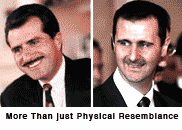
Do you support renaming the Beirut Airport as: "Rafic Hariri international Airport, Beirut"? , if yes, please sign the online petition
here Lebanon and Syria
Lebanon and SyriaWho will blink first?
Mar 31st 2005 | BEIRUTFrom The Economist print editionSyria's regime and its Lebanese proxies are rattled—but they won't give up yetWHAT a bind Lebanon's security services are in. This week's UN report by an Irish policeman, Peter Fitzgerald, accused them of planting, moving and discarding evidence that was crucial to the investigation into who planted the huge bomb that killed Lebanon's former prime minister, Rafik Hariri, in February. Worse, they are losing their Syrian masters, and no longer know to whom they should report. “Where are our policemen?” asked a former interior minister, Elias al-Mur, fearing that the 15-year-old system was collapsing in chaos.
Heads of Lebanon's security chiefs, accused by Mr Fitzgerald of “gross negligence”, are already rolling. The military-intelligence chief, General Raymond Azar, was the first to take a month's leave; the head of internal security, General Ali al-Haj, who began his spy career as Mr Hariri's driver, may well follow. In their wake, hundreds of Syria's remaining 10,000 troops in the country are rushing home. And Lebanon's pro-Syrian president, Emile Lahoud, has given in to opposition demands for a more extensive international inquiry into Mr Hariri's murder.
Syria's president, Bashar Assad, may be a lot less clever than his father, mock Lebanon's chattering classes. But unlike Saddam Hussein, he can read the lessons of history. Unusually, the UN's 16-page report virtually accused Mr Assad of the murder, citing reports that he had threatened Mr Hariri with “physical harm” last summer, should he refuse to obey Syrian orders to extend the mandate of their Lebanese client, Mr Lahoud. The UN report added that, in his last meeting with Mr Hariri, Mr Assad had bluntly told him that Mr Lahoud “should be viewed as his personal representative in Lebanon”.
Lest Mr Assad misunderstood the message in the report, the UN's secretary-general, Kofi Annan, met a chastened Syrian president last week in Algiers, to ram it home. “Given that the investigators lacked conclusive evidence,” says a Lebanese government official, “it's hard to see how it could have been more damning.”
But the Syrians have yet to give up their satellite: it is dangerous for a dictator to look weak. In the past fortnight, three big bombs have rocked Christian quarters of Greater Beirut, which even Lebanese security officers now blame on Syrian hands. While many Syrian workers have abandoned their Beirut flats, Syria's intelligence chief in Lebanon, Rostom Ghazali, hangs on in his headquarters in Anjar, a village in the Bekaa valley, in the country's south-east. And despite pressure from within the country that he should resign, Syria's most devoted Lebanese servant, the intelligence chief, Jamil al-Sayyid, refuses to bow out. “He still thinks he owns the country,” says a frustrated presidential adviser.
Even if Syria's old mukhabarat (intelligence service) slinks away, most Lebanese expect new ones back in a different guise. Syria's allies, including Hizbullah, Lebanon's Shia party-cum-militia, which still has some 20,000-plus men under arms, will still work as Syria's (and also Iran's) eyes and ears. In addition, the many Lebanese who are loyal to Syria because they owe their jobs to it, may be less ready to ditch their backer.
The heavily pro-Syrian parliament, in which only 35 or so of 128 MPs are in outright opposition, is flinching from the prospect of a general election, due in May. So one proposal is to lower the voting age from 21 to 19, to enfranchise more Shias, who tend to be more pro-Syrian and who have been breeding faster than their other compatriots. But a lot of pro-Syrian MPs would like simply to postpone the poll by filibustering until April 15th: thereafter, they say, it will be too late to hold an election in the current parliamentary term.
Omar Karami, the nominated prime minister who is proving unable to form a coalition government, has again promised to step down, but, to waste more time, he says he will make a formal announcement only after meeting political allies at the end of the week. Then comes the jockeying for a successor. “Elections now would be suicidal for the pro-Syrians,” says a presidential adviser. “The opposition would sweep 70%.” But should the government hold out for another six months, the pro-Syrians' chances might improve. The longer the delay, the greater the likelihood that the fragile alliance of Sunnis, Druze and Maronite Christians would crumble.
If Lebanon's pro-Syrian politicians are refusing to buckle without a fight, so too are their ruling friends in Damascus. Many Syrians, affronted by what they see as Lebanon's anti-Syrian invective and apparent ingratitude for the 15,000 Syrian troops who have died trying to rescue their squabbling neighbour from civil war, have rallied to the government's cause. Besides, Syria's opposition is much feebler than Lebanon's. Pro-American exiles have no local constituency, intellectuals in Damascus have little nerve, and—to the delight of many in the Syrian establishment—Syria's Sunni jihadis, who have long been hostile to the secular Assad dynasty, have been killing themselves in Iraq.
In addition, Mr Assad has been strengthening his own hand at the expense of some of his father's old friends. The armed forces' former chief of staff, Hikmet Shihabi, was sent packing to Los Angeles; the longstanding vice-president, Abdul Halim Khaddam, has lost his portfolio for overseeing Lebanon. A third member of this political-cum-business trio, Mr Hariri, whose Sunni leadership stretched far into Syria, is now conveniently dead.
In its place, Mr Assad has surrounded himself with family friends from his minority Alawite sect, including his brother-in-law, Asaf Shawkat, who heads military intelligence; his brother, Maher Assad, the unofficial head of the presidential guard; and Bahjat Suleiman, who runs internal intelligence, a professor who was among the first to boost Mr Assad's reputation when his father's old guard considered him weak. Of his father's advisers, only Ghazi Kenan, Syria's ruthless viceroy in Lebanon for two decades, has been brought back from the lesser job of overseeing Syria's Kurds, to take over the interior minister and muzzle the opposition.
But perhaps Mr Assad's best—and most unlikely—hope for survival, at any rate for a bit longer, is that the American administration will lessen its pressure. Still bogged down badly in Iraq, George Bush may be wary of encouraging regime change across the border, in Damascus, until and unless there is a clear plan for an alternative. So far, there is no sign of one.



























